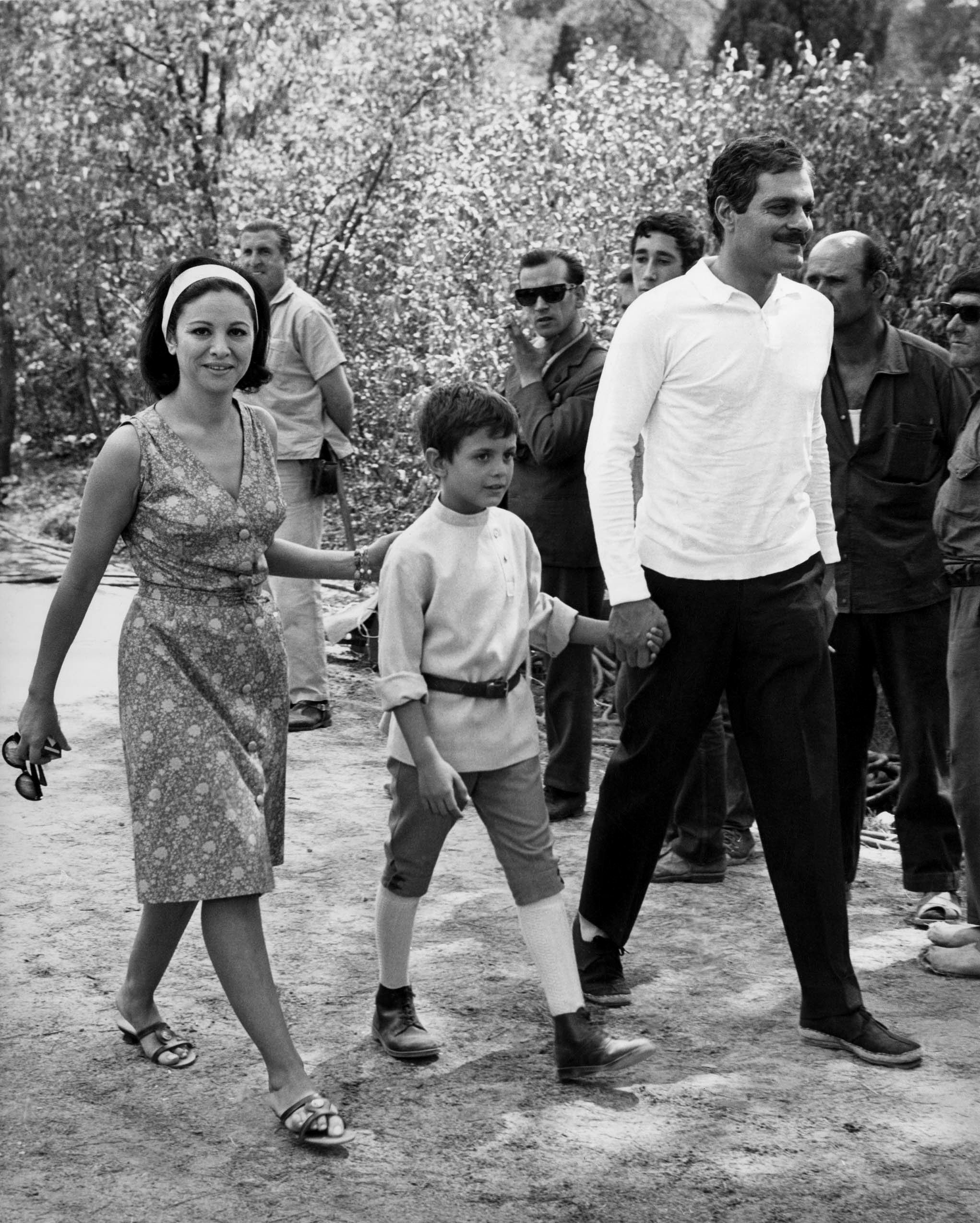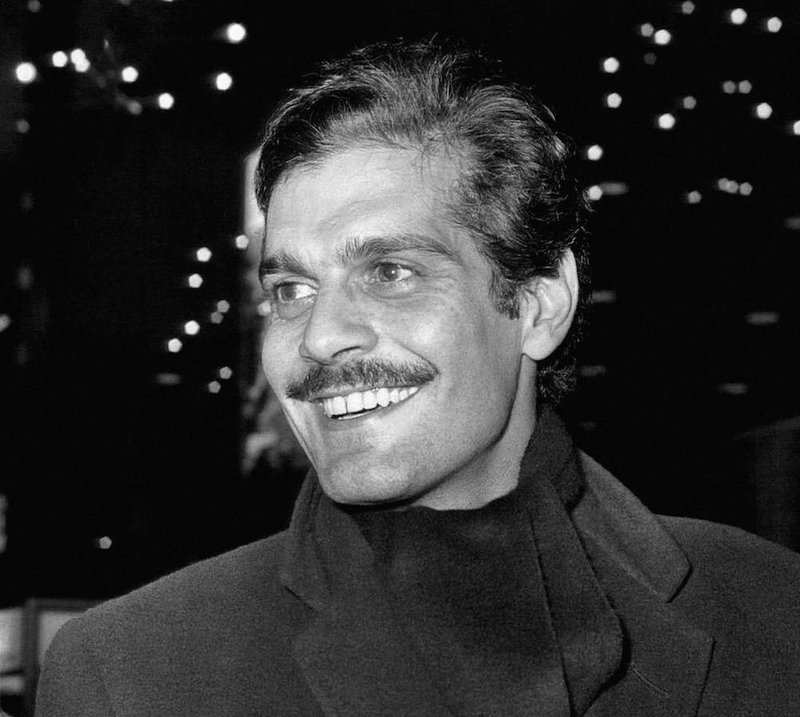Lawrence of Arabia
Sharif's first English-language role was that of (the fictitious) Sherif Ali in David Lean's historical epic Lawrence of Arabia in 1962. Sharif was given the role when Dilip Kumar turned it down, Horst Buchholz proved unavailable and Maurice Ronet could not use the contact lenses necessary to hide his eyes.
Casting Sharif in what is now considered one of the "most demanding supporting roles in Hollywood history" was both complex and risky as he was virtually unknown at the time outside Egypt. However, as historian Steven Charles Caton notes, Lean insisted on using ethnic actors when possible to make the film authentic. Sharif would later use his ambiguous ethnicity in other films: "I spoke French, Greek, Italian, Spanish and even Arabic", he said. As Sharif noted, his accent enabled him to "play the role of a foreigner without anyone knowing exactly where I came from", which he stated proved highly successful throughout his career.
To secure the role, Sharif had to sign a seven-film contract with Columbia at $50,000 a film.
Lawrence was a box office and critical sensation. Sharif's performance earned him an Academy Award for Best Supporting Actor nomination and a Golden Globe Award for Best Supporting Actor – Motion Picture, as well as a shared Golden Globe Award for New Star of the Year – Actor.
Sharif went on to star in another Hollywood film, Anthony Mann's The Fall of the Roman Empire (1964) where he played the support role of Sohaemus of Armenia.
Sharif was third-billed in Columbia's Behold a Pale Horse (1964), playing a priest in the Spanish Civil War alongside Gregory Peck and Anthony Quinn. Director Fred Zinnemann said he chose Sharif partly on the suggestion of David Lean. "He said he was an absolutely marvelous actor, 'If you possibly can, take a look at him.'" Film historian Richard Schickel wrote that Sharif gave a "truly wonderful performance", especially noteworthy because of his totally different roles in Lawrence of Arabia: "It is hard to believe that the priest and the sheik are played by the same man". The film, like Fall of the Roman Empire, was a commercial disappointment.
Sharif was one of many stars in MGM's The Yellow Rolls-Royce (1964), playing a Yugoslav wartime patriot; the movie was a hit.
Sharif had his first lead role in a Hollywood movie when he was cast in the title part of Genghis Khan (1965). Produced by Irving Allen and directed by Henry Levin for Columbia, the $4.5 million epic was a box office disappointment. He had a supporting role in a French Marco Polo biopic, Marco the Magnificent (1965), starring Buchholz and Quinn.
Doctor Zhivago
With Geraldine Chaplin in Doctor Zhivago (1965).
While making Genghis Khan Sharif heard that Lean was making an epic love story Doctor Zhivago (1965), an adaptation of Boris Pasternak's 1957 novel. Sharif was a fan of the novel and pitched himself for one of the supporting roles; Lean decided to cast him in the lead, as Yuri Zhivago, a poet and physician.
Film historian Constantine Santas explained that Lean intended the film to be a poetic portrayal of the period, with large vistas of landscapes combined with a powerful score by Maurice Jarre. He noted that Sharif's role is "passive", his eyes reflecting "reality" which then become "the mirror of reality we ourselves see".
In a commentary on the DVD (2001 edition), Sharif described Lean's style of directing as similar to a general commanding an army. The film was a huge hit. For his performance, Sharif won the Golden Globe Award for Best Actor – Motion Picture Drama. Doctor Zhivago remains one of the top ten highest-grossing films of all time after adjusting for inflation.
Sharif followed it with a cameo in The Poppy Is Also a Flower (1966). He, O'Toole and Lawrence producer Sam Spiegel were reunited in The Night of the Generals (1967), playing a German officer in World War II, his fourth movie for Columbia. The film was not a success. Neither was the Italian-French fairytale More Than a Miracle (1967), despite its co-starring Sophia Loren.
Funny Girl
Sharif was also praised for his portrayal of Nicky Arnstein in Funny Girl (1968), at Columbia. He portrayed the husband of Fanny Brice, played by Barbra Streisand in her first film role. His decision to work alongside Streisand angered Egypt's government because she was a vocal supporter of the State of Israel, and the country condemned the film. It was also "immediately banned" in numerous Arab nations. Streisand herself jokingly responded, "You think Cairo was upset? You should've seen the letter I got from my Aunt Rose!" Sharif and Streisand became romantically involved during the filming.
He admitted later that he did not find Streisand attractive at first, but her appeal soon overwhelmed him: "About a week from the moment I met her", he recalled, "I was madly in love with her. I thought she was the most gorgeous girl I'd ever seen in my life...I found her physically beautiful, and I started lusting after this woman."

 Amanda S. Stevenson
Amanda S. Stevenson 
 Amanda S. Stevenson
Amanda S. Stevenson 
 Amanda S. Stevenson
Amanda S. Stevenson 
 Amanda S. Stevenson
Amanda S. Stevenson 
 Amanda S. Stevenson
Amanda S. Stevenson 
 Amanda S. Stevenson
Amanda S. Stevenson 
 Amanda S. Stevenson
Amanda S. Stevenson 